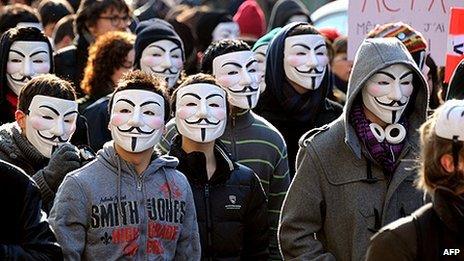Anonymous, hacktivism and the rise of the cyber protester
- Published

'V for Vendetta' Guy Fawkes masks are known as the symbol of Anonymous
Computer 'hacktivists' cause havoc targeting the websites of governments, companies and the police but who they are and what motivates them?
It is 4 o'clock in the morning and I'm waiting for a Skype call from a computer hacker on the run in Canada.
After weeks of contact through Twitter and encrypted emails with "Commander X", I should finally have the chance to speak to him in person. After an hour with no call, I give up and return to bed.
"You can never have complete certainty as to what's going on, who's involved," says Gabriella Coleman, an anthropologist at McGill University in Canada, who has spent years studying hackers operating under the banner of Anonymous.
But, she says, "not being able to fully understand who's behind the mask" is what gives Anonymous political power.
Even if you have never heard of Anonymous, you have probably seen their supporters wearing the distinctive Guy Fawkes masks made famous in the comic book series and film V for Vendetta.
The movement emerged in 2008 following an attack on the website of the Church of Scientology. Since then their targets have ranged from companies like PayPal through to politicians and governments. But who are the people carrying out these attacks and why do they do it?
"It's about the right not to be oppressed by governments or any organisation for that matter," says a young Scottish activist talking to me from a webcam in his bedroom.
"We want to fight the powers-that-be when they overstep the lines," he adds.
He goes by the nickname Dr Steelhammer, and his first operation this year was to attack Catholic Church websites over the Church's opposition to gay marriage in Scotland.
Dr Steelhammer tells me they brought down one website for half an hour - but, I wondered, what was the point?
"The internet is not some playground that corporations and governments can take basic civil liberties with and destroy them and get away with it," he says.
As far as big companies are concerned he says "we have shown that around 10,000 angry people can make them lose a lot of profit by taking down their websites."
He is referring to the notorious hacking of the Sony website in 2011 when the company's PlayStation network was taken down for weeks and millions of users accounts were accessed.
It is estimated to have cost the company over $100 million and was part of a 50-day rampage by a group of hackers known as Lulz Security - or LulzSec - which targeted organisations ranging from the FBI to Britain's Serious Organised Crime Agency (SOCA).
Over a dozen people around the world have been arrested and charged over the attacks and if convicted, they could face years in prison.
'Tier One threat'
I spoke to one of them who is currently on bail - so we are not using his name. Smart and articulate, he is also a realist.
"I'm not under the illusion that we're going to change the world," he tells me, "but if we can make a big enough noise for people to notice there's a problem and scream loud enough, someone's going to take notice. That's what Anonymous is."
Although he is a skilled programmer, he says Anonymous has grown quickly because you do not need to be tech savvy to become involved.
"People who are too lazy or don't have the guts to go out and actively protest and campaign... it's so easy with Anonymous, the normal Joe can just click a button and you're away."
I find out just how easy it is in a cafe in Edinburgh where I meet a hacker, Martin - not his real name. He arrives with a netbook and, in a few minutes, shows me how to download software which has a big red button asking you to fire the laser.
If you do, it will send millions of page requests to a website or server trying to overload it, causing it to crash.
This is what worries the people who are trying to deter and catch the Anonymous hackers, like Detective Superintendent Charlie McMurdy - head of the Metropolitan Police's beefed up e-Crime unit, who has over 100 staff under her command. She classes these attacks as a "Tier One" threat.
"People tend to think it's online, it's almost like a game rather than that clicking that button is actually causing serious harm," she says.
In just a few years, Anonymous has grown from a handful of hardened hackers into a movement whose targets range from the Syrian government to paedophile websites.
Although currently at the entry level of activism, Dr Steelhammer has some advice for those pursuing Anonymous:
"What I would say to Scotland Yard, the FBI, the federal government in America is 'why are you even bothering to pursue us because there are too many of us?'"
The Hackers will be broadcast on Tuesday 27 November at 20:00 GMT on BBC Radio 4. Listen again via the Radio 4 website.
- Published22 November 2012
- Published29 August 2012
- Published24 October 2012
- Published3 February 2012